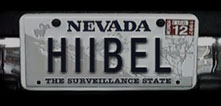Absent clear public interest, government should butt out
Portland Press Herald, 24 March 2004
A Nevada law requiring people to give their names to police should be found unconstitutional.
The irony of Larry Hiibel's crime of not giving his name to police when he was asked to provide it is that, if he had already been placed under arrest, he wouldn't have had to say anything at all.
Hiibel's case found its way to the U.S. Supreme Court this week following his conviction for violating Nevada's disclosure law.
An officer investigating a report of a man striking a woman in a pickup truck arrested Hiibel. It seems Hiibel had the misfortune of sitting in a truck beside his daughter when spotted by the officer. Asked repeatedly to identify himself, Hiibel refused.
It's important to make clear Hiibel's alleged crime: He didn't interfere with an investigation. He didn't resist arrest. He didn't ignore a court order to provide information to law enforcement.
Hiibel was convicted under a Nevada law that says when a police officer asks you your name, you have to give it.
There are plenty of times when the government has a legitimate interest in knowing our identities. When using public transportation, for instance, security may require that we be properly identified. The same is true when we apply for a public permit of some kind.
Absent a compelling public interest, however, the government shouldn't have the right to pry into our affairs, including our identities. First Amendment guarantees of free speech and Fourth Amendment rights to privacy should protect us from this kind of unwarranted government intrusion into our lives.
Had Larry Hiibel been under arrest at the time of his questioning, he would have had a right to silence. Shouldn't the same privilege be granted to people not in police custody?
